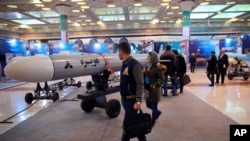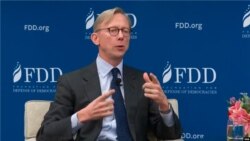Iran would become the “arms dealer of choice” for terrorists if a U.N. weapons embargo is allowed to expire, a senior U.S. official says.
Brian Hook, the U.S. special representative for Iran, spoke to the Associated Press during a visit to the United Arab Emirates.
The U.N. imposed its current arms embargo on Iran in 2010, and it is set to expire in October.
Hook said the world should ignore Iranian threats of retaliation if the embargo is extended.
“If we play by Iran's rules, Iran wins,” he told the AP. “It is a mafia tactic where people are intimidated into accepting a certain kind of behavior for fear of something far worse.”
The U.N. arms embargo has stopped Iran from openly buying fighter jets, tanks, warships and other weaponry. But it has not stopped Iran from sneaking weapons into such war zones as Yemen, where Iran backs the Houthi rebels.
Iran has denied supplying arms to the rebels. But Hook says if the embargo expires, it may not have to use alleged smuggling as a tactic anymore.
"If we let it expire, you can be certain that what Iran has been doing in the dark, it will do in broad daylight and then some,” he told the AP.
The U.S. Defense Intelligence Agency predicted last year that Iran would try to buy Russian fighter jets, tanks and anti-aircraft missile systems if it were allowed to.
But U.S. economic sanctions on Iranian oil sales have nearly wrecked the Iranian economy.
When a reporter asked Hook how Iran could pay for such expensive equipment, he said it is “a good thing for the region” that Iranian revenues are way down, adding that it also complicates Iranian efforts to back such allies as Syria’s Bashar al-Assad.
“We have put this regime through our strategy on the horns of a dilemma,” Hook said. “They have to choose between guns in Damascus or butter in Tehran.”
Iran did not immediately commented on Hook’s remarks. But Iranian President Hassan Rouhani on Sunday called 2020 Iran's “most difficult year” because of U.S. economic sanctions and the coronavirus outbreak.






